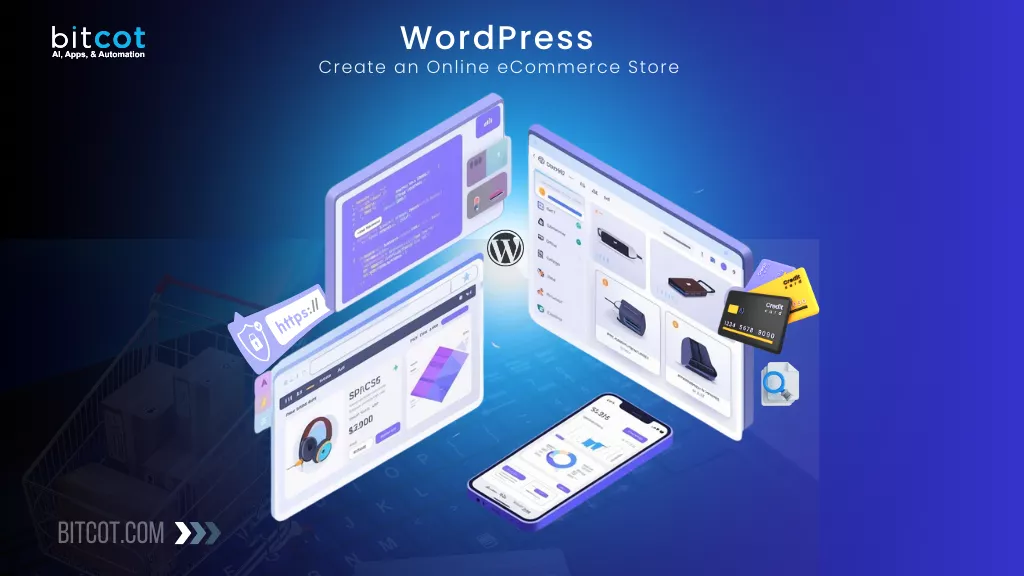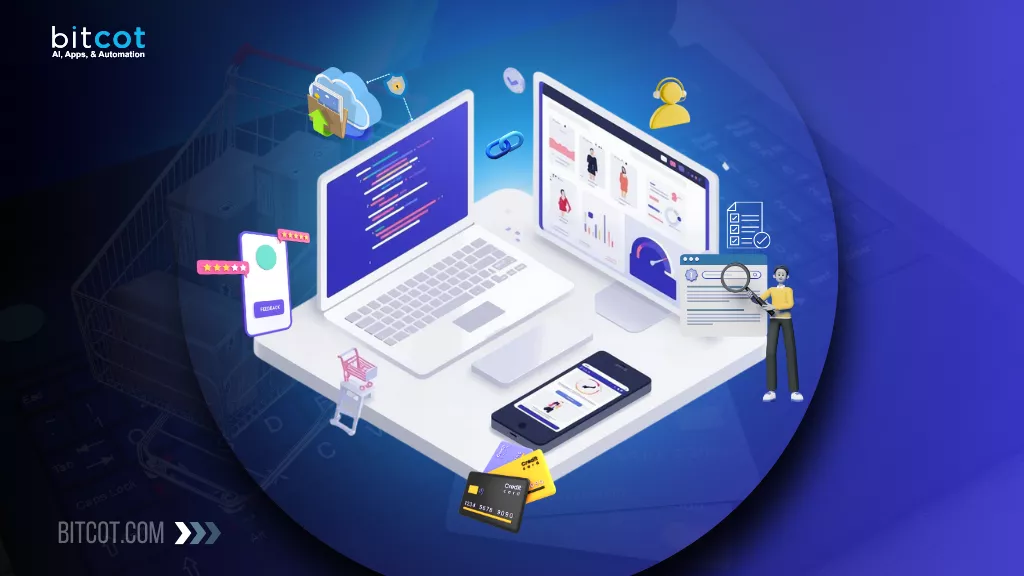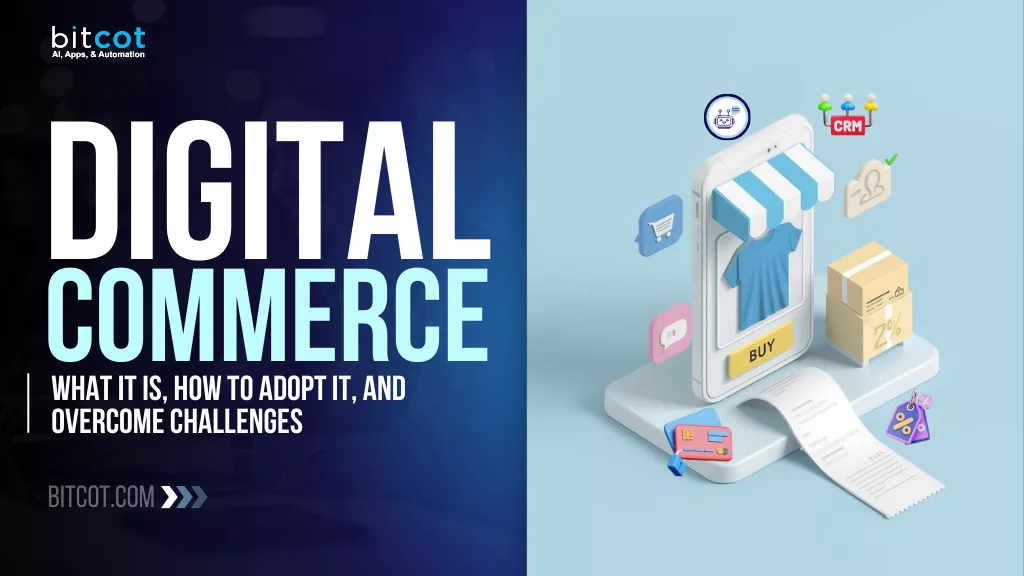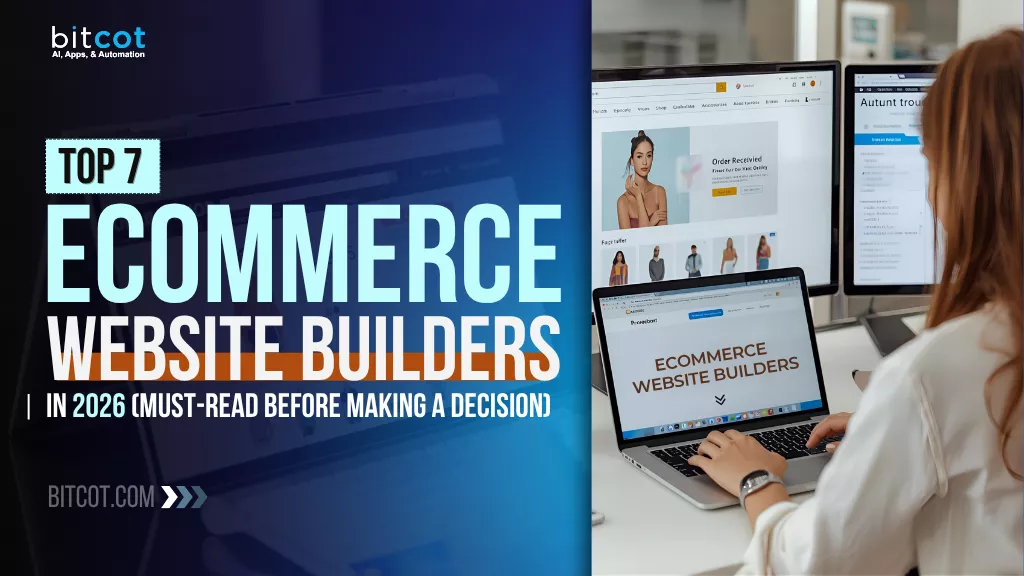
Your online shoppers browse from everywhere: your website, Instagram Shop, TikTok ads, and Google search, expecting a smooth, fast, and trustworthy buying experience every single time.
But when your eCommerce platform holds you back, every visitor feels like they’re hitting a wall. Pages load slowly, checkout breaks, plugins conflict, and you lose sales without even knowing why.
Sound familiar?
Today’s customers expect seamless product browsing, lightning-fast checkout, mobile-first design, and secure payments: no excuses. When your store can’t keep up, abandoned carts rise, conversions drop, and growth stalls.
In this post, we break down the best eCommerce website builders in 2026, with a clear, practical look at what each platform actually does well. From customization and scalability to AI-powered tools and marketing automation, you’ll see exactly how each builder supports your business at different stages of growth.
You’ll get real-world examples and a simple decision roadmap you can use to choose the right platform before investing time, money, and resources.
Ask yourself:
- How many sales are slipping through the cracks because your platform can’t scale?
- How often do you spend hours fixing issues instead of focusing on growth?
- You already feel these friction points, but where are you now in solving them?
Whether you’re a startup founder, a non-technical business owner, or part of a scaling eCommerce team, this choice is critical. Every broken link or failed checkout is a lost customer.
Modern eCommerce builders are changing that. With AI-enhanced product management, built-in marketing tools, and frictionless checkout systems, they help you sell smarter, not harder.
Bitcot helps businesses make that shift. We build powerful, scalable eCommerce sites that load fast, convert better, and support long-term growth.
The future of online selling is already here. Are you ready to choose the best e-commerce platform that will help you get ahead?
What Are eCommerce Website Builders and Why Do They Matter?
eCommerce website builders are online tools that help you create a store without needing to write code or hire a full development team.
Think of them as beginner-friendly platforms where you can design your site, add products, set up payments, and manage orders all in one place.
These builders usually come with drag-and-drop editors, ready-made templates, and built-in features like inventory tracking, SEO settings, shipping options, and marketing tools. Instead of worrying about the technical setup, you can focus on creating a great shopping experience for your customers.
Most platforms also offer hosting, security, and responsive design so your store looks good on any device. Whether you are launching your first online shop or moving an existing business onto the web, an eCommerce website builder can make the process faster, simpler, and far more affordable.
eCommerce website builders matter because they remove the biggest barriers to starting an online business. Instead of spending thousands on developers or struggling with complex software, anyone can build a functional store in a short amount of time.
They make online selling more accessible, affordable, and efficient, which helps entrepreneurs focus on products, customers, and growth rather than technical hurdles.
Here is what they typically offer:
- Drag and drop design tools that help you customize your store layout without touching code.
- Professional templates that give you a clean, modern look right from the start.
- Product management features including inventory tracking, variations, pricing, and categories.
- Secure checkout and payment integrations so customers can pay with cards, wallets, or other online methods.
- Shipping and tax settings that let you automate costs based on location and product type.
- Built-in marketing tools like email integrations, discount codes, and SEO controls.
- Hosting and security which means the platform handles things like uptime, SSL certificates, and performance.
Most eCommerce website builders are designed to be user-friendly, so you can launch your store quickly even if it is your first time. They not only simplify the setup process but also give you room to scale as your business grows.
Key Features of a Modern eCommerce Website Builder
A modern commerce website builder gives you all the tools needed to run an online store from day one. These platforms are designed to simplify everything, from building your storefront to managing orders and promoting your products.
Instead of juggling different apps or figuring out complicated tech, you get an all-in-one system that works smoothly behind the scenes.
Here is a more detailed look at the features that make these builders so effective:
- Intuitive visual editor: Most builders offer a drag-and-drop editor that lets you design your site by simply clicking and moving elements around. You can customize pages, add images, tweak text, and create product sections without writing a single line of code. This makes it easy to update your store whenever you need to.
- Flexible product management: A good commerce builder handles both physical and digital products. You can add product variations, set custom pricing, manage stock levels, receive low inventory alerts, and organize items into categories. Many platforms support bulk uploads, too, which saves a lot of time if you have a large catalog.
- Built-in payment processing: Modern builders integrate with trusted payment gateway solutions that allow your customers to pay using cards, digital wallets, bank transfers, and more. The entire checkout process is designed to be secure and smooth, which helps improve conversion rates.
- Mobile responsive templates: With so much shopping happening on phones, your store must look great on every device. Most builders offer mobile-optimized templates that automatically adjust layouts and visuals so customers have a seamless experience on smaller screens.
- Search engine optimization tools: To help people find your store, builders come with SEO features such as customizable meta tags, clean URLs, fast loading speeds, and image optimization. Some platforms also offer SEO hints to guide beginners.
- Integrated shipping and tax settings: You can set up shipping zones, rates, delivery options, and automated taxes based on customer locations. This helps you stay compliant and reduces manual work, especially if you sell in multiple regions.
- Marketing and sales tools: Many builders include marketing features like email campaign integrations, discount codes, upsell sections, social media connections, blog tools, and abandoned cart reminders. These features help you attract shoppers and encourage repeat purchases.
- Analytics and reporting dashboards: A built-in analytics dashboard gives you valuable insights into traffic, sales trends, customer behavior, and popular products. Clear reporting helps you make smarter business decisions and spot growth opportunities.
- Secure hosting and site protection: Modern builders take care of hosting, updates, backups, and security. You usually get an SSL certificate included, which protects customer data and builds trust. This means you spend less time worrying about technical maintenance and more time running your business.
Together, these features help you create a polished, reliable, and scalable online store without needing advanced tech skills. They provide the kind of structure and support that allows small businesses and independent creators to compete with much larger brands.
| Category | Key Feature | Core Benefit |
|---|---|---|
| User Experience | Drag-and-Drop Editor | Enables fast, code-free visual customization of the storefront. |
| Mobile-First Design | Ensures the store is functional and attractive on all mobile devices (where most traffic originates). | |
| Sales & Transactions | Secure Multi-Gateway Payments | Accepts all major credit cards and digital wallets safely and reliably. |
| Real-Time Inventory Tracking | Prevents overselling and provides accurate stock visibility. | |
| Growth & Marketing | Built-in SEO Tools | Optimizes product pages and site structure for better search engine rankings. |
| App Store / Extensibility | Allows integration with third-party tools (CRM, ERP, advanced marketing). | |
| Operations | Automated Shipping & Tax | Calculates accurate rates and taxes instantly based on location and carrier. |
| High Performance Hosting (CDN) | Guarantees fast loading speeds globally to reduce bounce rates. |
How We Selected the Best eCommerce Website Builders in 2026
To determine the leading ecommerce website builders for 2026, we tested each platform hands-on and evaluated how well it supports modern online businesses.
Our goal was to identify builders that are easy to use, rich in features, reliable, and ready for future growth. Each criterion was assessed with equal weight to ensure a fair and thorough comparison across all platforms.
Ease of Use
We examined how straightforward it is to set up a store, customize pages, and manage everyday tasks without technical skills. This included checking how intuitive the editor feels, how clear the navigation is, and how quickly new users can move from setup to publishing. Platforms that offered a smooth learning curve and minimal friction during early stages performed strongest in this category.
Design Flexibility
We looked at the variety and quality of templates, along with how much creative control users have when personalizing their store. This included reviewing layout customization, branding options, media placement, and overall editing freedom. Builders that balanced attractive design with flexible customization earned higher scores because they support unique branding needs.
Core Commerce Features
We evaluated the essential tools needed to run a real store, such as product variations, inventory management, shipping settings, tax controls, and order fulfillment workflows. Each platform was tested to see how efficiently these tasks could be handled and whether the features were scalable. Platforms offering strong, easy-to-use commerce tools were rated more favorably.
Performance and Reliability
We assessed speed, uptime stability, and built-in security features to understand how dependable each platform is under real-world conditions. This involved checking load times, server responsiveness, and protective measures against common threats. Builders with consistent performance and reliable hosting scored highest, since stability directly affects customer trust.
Payment and Checkout Experience
We reviewed how many payment methods each platform supports, how easy the checkout flow is, and how secure the transaction process feels. This included analyzing supported currencies, transaction fees, and the overall checkout design from a customer’s perspective. Systems that offered smooth, secure, and flexible payment experiences ranked higher in this area.
Marketing and Growth Tools
We analyzed the variety and depth of built-in tools designed to help businesses attract and retain customers. This included SEO settings, promotional features, email marketing support, automation, and social integrations. Platforms offering strong marketing features without requiring multiple third-party apps were considered more growth-friendly and received higher ratings.
Cost and Overall Value
We compared pricing plans, transaction fees, feature availability, and long-term scalability to understand the true cost of ownership. This involved looking at how much value users receive at each tier and whether essential functions require additional upgrades. Builders that offered fair pricing, transparent fees, and strong features at every level ranked best in overall value.
Customer Support and Educational Resources
We evaluated the availability and quality of customer service, including live chat, email responses, and helpfulness of representatives. Additionally, we reviewed the depth of tutorials, documentation, and community learning resources. Platforms that delivered prompt, clear, and consistent support were rated higher because they help users solve problems quickly.
Innovation and Future Readiness
We explored how actively each platform adopts new technologies, updates features, and prepares for emerging ecommerce trends. This included looking at AI capabilities, automation improvements, integration expansions, and enhancements to design and management tools. Builders that demonstrate innovation and future-focused development scored strongest in this final category.
Top 7 eCommerce Website Builders in 2026
Thinking about launching an online store or maybe upgrading your current one?
The world of eCommerce is constantly changing, and what was “the best” last year might be falling behind now. You need a platform that’s ready for the future, especially with AI, social commerce, and personalized experiences becoming the new standard.
Choosing the right website builder is a massive decision. It’s not just about a pretty template; it’s about scalability, marketing tools, and not getting locked into a system that can’t handle your growth.
We’ve sifted through the noise and looked ahead to bring you the seven eCommerce website builders we predict will be leading the pack in 2026.
1. Shopify

If you have serious growth ambitions, Shopify is still the industry gold standard. It’s purpose-built for selling and is designed to handle everything from a few dozen products to a complex, high-volume inventory.
- Why it’s a 2026 leader: Its ecosystem is unmatched. The sheer number of apps and integrations means you can add almost any functionality your growing business needs. Plus, their native payment system and focus on “best-converting checkout” remain crucial for boosting sales.
- Best for: Businesses focused on rapid, high-volume growth.
2. Wix

Wix is legendary for its intuitive drag-and-drop editor. It has evolved far beyond simple brochure sites and now offers robust eCommerce features that are incredibly easy for anyone to manage.
- Why it’s a 2026 leader: User-friendliness is king. With the rise of AI tools like Wix ADI that can build your initial store for you, it has lowered the barrier to entry for new entrepreneurs. Its template variety gives you huge creative freedom right out of the box.
- Best for: Beginners and small to medium-sized businesses that prioritize design flexibility and an easy setup.
3. WooCommerce (with WordPress)
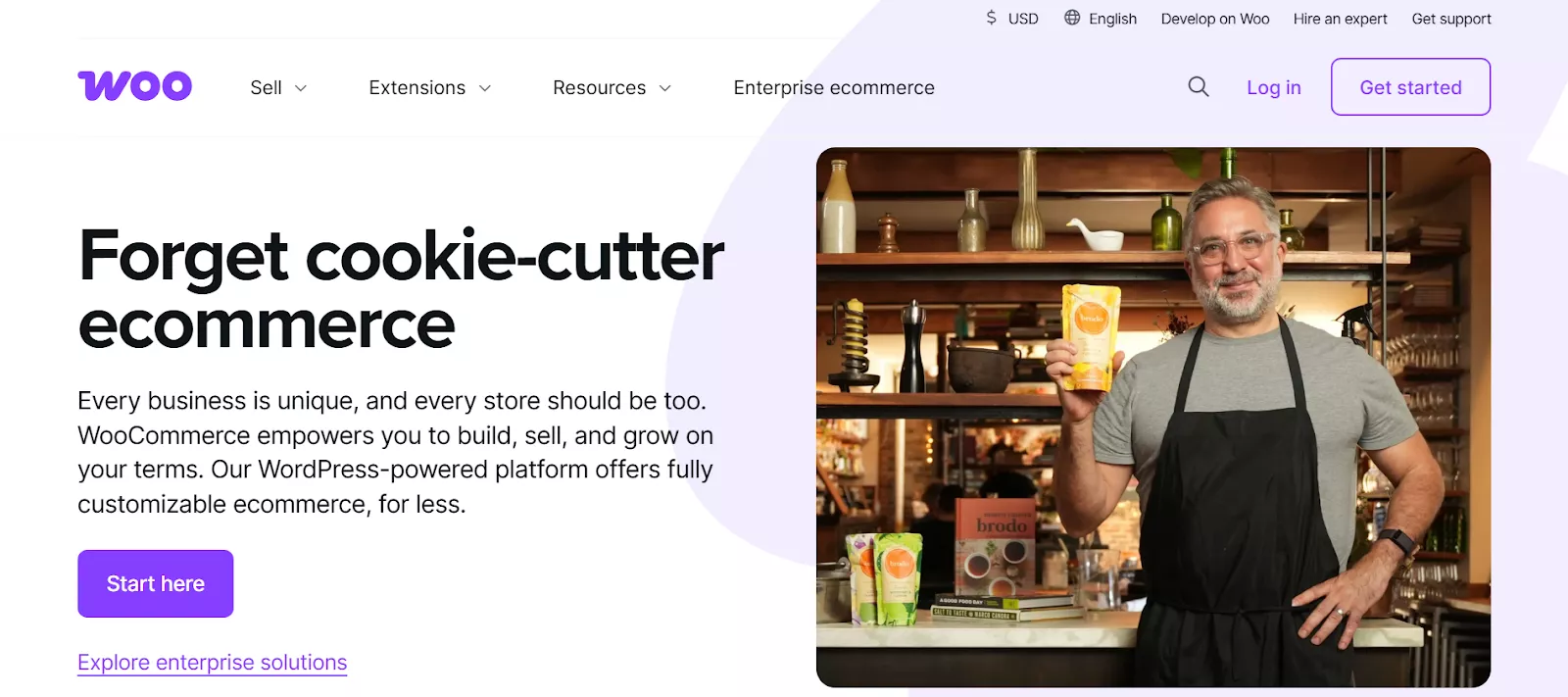
WooCommerce is a free, open-source plugin that turns the world’s most popular CMS, WordPress, into a powerful online store. It takes a little more technical know-how, but the payoff is total control.
- Why it’s a 2026 leader: For those who want zero limitations. Its massive ecosystem of themes and plugins gives you granular control over SEO, payment gateways, and design. If you want a truly unique site that you can own completely, this is it.
- Best for: Developers, tech-savvy entrepreneurs, and stores that need highly specific custom features.
Also Read: How Bitcot Empowers eCommerce Businesses with WooCommerce and WordPress Solutions
4. BigCommerce
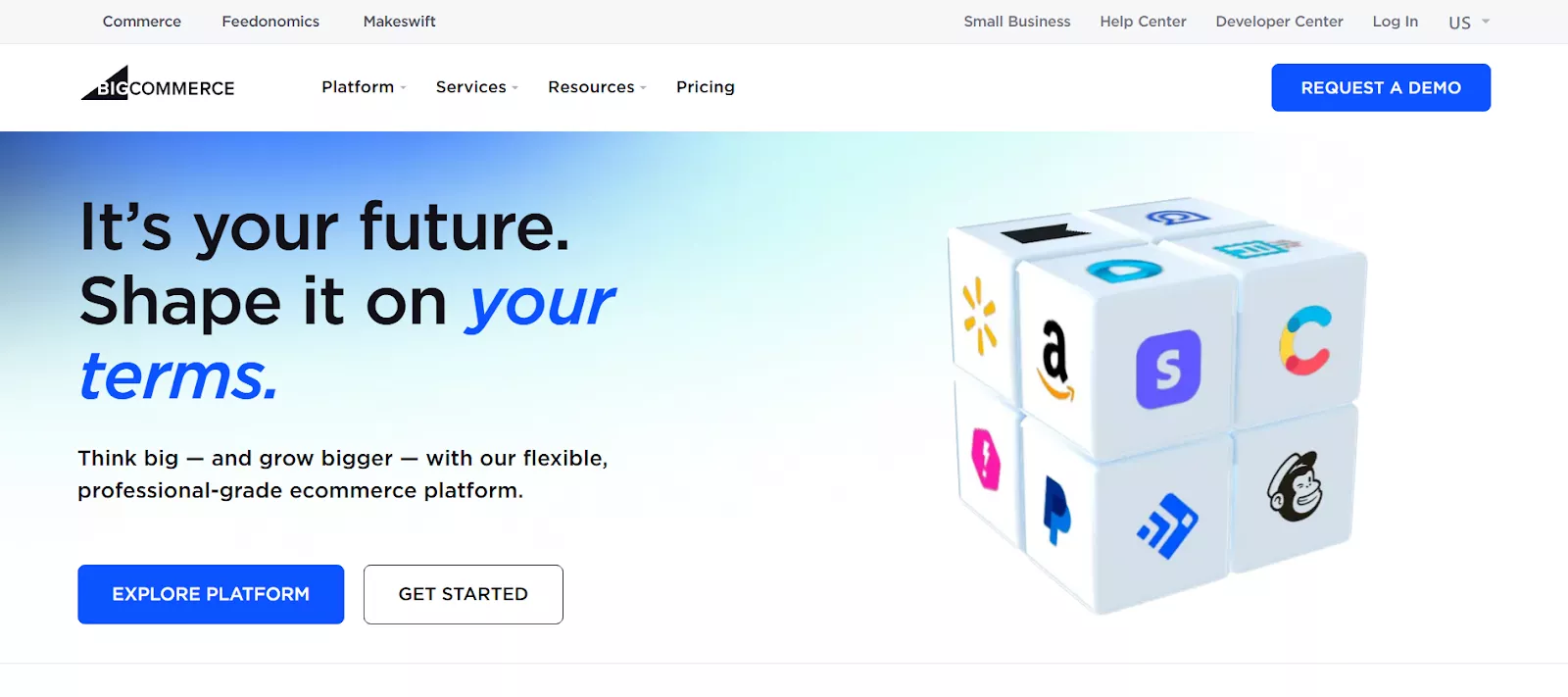
While some builders focus on simplicity, BigCommerce focuses on high-end features right out of the box, without needing tons of extra apps. We are talking serious, enterprise-level stuff like multi-channel selling and advanced SEO.
- Why it’s a 2026 leader: It’s ready for the omnichannel future. It excels at integrating with places like Amazon, Facebook, and Instagram, helping you manage all your sales channels from one dashboard.
- Best for: Larger businesses and high-growth stores that need powerful B2B or multi-channel capabilities.
5. Squarespace

If your product relies heavily on beautiful imagery and a polished, professional look, Squarespace is your go-to. Their templates are award-winning and mobile-optimized, ensuring your brand always looks impeccable.
- Why it’s a 2026 leader: Design is a conversion tool. Squarespace offers stunning, modern templates and built-in marketing features that appeal directly to lifestyle and creative brands. They make complex designs look simple and elegant.
- Best for: Creatives, artists, and brands selling premium or visually driven products and services.
6. Hostinger
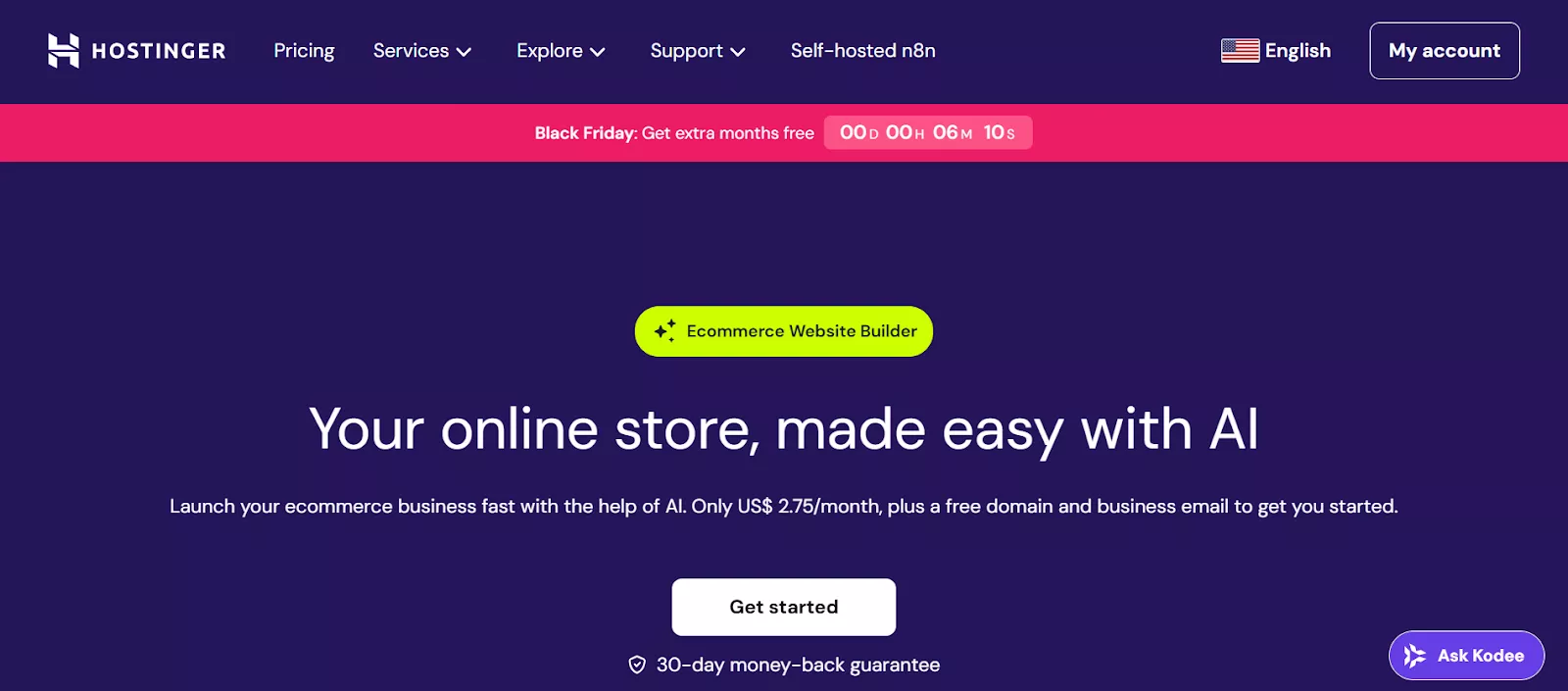
Hostinger is emerging as a top contender, particularly for budget-conscious users who still demand speed and powerful performance. Their AI builder tools are making it extremely fast to get a site launched.
- Why it’s a 2026 leader: Combining an easy-to-use AI builder with strong performance and competitive pricing makes it an excellent choice for side hustles or new businesses. They are focused on giving you a lot of value for a low monthly price.
- Best for: Solopreneurs, side hustlers, and small businesses looking for an affordable, fast launch.
7. Square Online

If your business has a physical location, a pop-up shop, or sells at markets, Square Online is a smart pick. It is built to work seamlessly with Square’s popular Point-of-Sale (POS) system.
- Why it’s a 2026 leader: The unified commerce experience is essential. Managing both your in-person and online inventory, sales, and payments from a single, trusted provider simplifies your operations dramatically.
- Best for: Brick-and-mortar stores, restaurants, and businesses that need powerful POS and online sales integration.
Choosing the right eCommerce website builder can make or break your online business, especially as digital competition increases.
How to Choose the Right eCommerce Website Builder?
Finding the right home for your online store isn’t about picking the flashiest name; it’s about aligning the platform’s features with your specific business needs and your future growth vision. Choosing the wrong one can mean costly migrations and lost sales down the road.
Here’s a simple checklist of key factors to evaluate, focusing on the features that matter most in the 2026 digital landscape:
1. Scalability and Future-Proofing
This is the most critical factor. What happens when you go from 100 orders a month to 10,000?
- Traffic Handling: Can the platform handle major traffic spikes during holiday sales or viral marketing campaigns without crashing? Hosted solutions like Shopify and BigCommerce typically excel here.
- Product Capacity: Do you plan to have 10 products or 10,000? Some builders have limits or slow down significantly with huge catalogs.
- International Readiness: If global expansion is a goal, look for built-in features for multi-currency, multilingual support, and regional tax calculations.
2. Total Cost of Ownership (TCO)
The sticker price is just the beginning. You need to calculate the total cost.
- Monthly Subscription: The base plan fee.
- Transaction Fees: Does the platform charge a fee on your sales if you don’t use their proprietary payment processor? (e.g., Shopify does). This can add up fast.
- App/Plugin Costs: Many essential functions, like advanced reviews or complex shipping, require paid third-party apps. Check how many of these you’ll need and their monthly fees.
- Theme/Design Costs: Is the perfect, modern theme you love free, or does it cost a one-time fee of a few hundred dollars?
3. Design, Customization, and User Experience (UX)
Your brand identity and how easy the store is to navigate directly impact conversions.
- Ease of Use: If you are a beginner, a drag-and-drop builder like Wix or Hostinger is ideal. If you are a developer, an open-source option like WooCommerce gives you infinite control.
- Template Quality: Do the available themes look modern, and are they automatically mobile-friendly? Over 50% of purchases happen on a mobile device, so this is non-negotiable.
- Brand Flexibility: Can you truly customize the look and feel to match your brand without needing to write code?
4. Built-in Tools and Integrations
Look at what the platform does natively versus what you need an external app for.
- SEO: Are the basic SEO controls (custom URLs, metadata editing) easy to access? This determines how easily people find you on Google.
- Inventory & Fulfillment: Does it integrate easily with the shipping carriers and warehouse systems you plan to use? This is vital for operational efficiency.
- AI Features: In 2026, many platforms will be offering AI for product descriptions, customer service (chatbots), and personalized recommendations. Look for builders that prioritize these advanced tools.
- Omnichannel Support: If you sell on Instagram, Amazon, or a physical store, can you manage all those sales and inventory levels from the platform’s single dashboard? Square and BigCommerce are strong here.
Choosing an eCommerce builder is a foundational investment. Take advantage of free trials and try to replicate your core business workflows on the platform before you commit!
Partner with Bitcot to Build Your Custom eCommerce Website
If you’re looking for more flexibility and long-term scalability than a standard website builder can offer, partnering with Bitcot is one of the best ways to create a fully custom eCommerce website. We specialize in building tailored online stores that match your brand identity, business needs, and customer expectations.
A custom eCommerce site offers advantages that go far beyond templates or prebuilt layouts. With Bitcot, you get a solution crafted specifically for your goals. Our team focuses on creating high-performance, secure, and user-friendly experiences that support both present-day operations and future growth.
Here’s what Bitcot brings to your eCommerce project:
- Industry-experienced developers who understand modern eCommerce trends and best practices.
- Tailored solutions designed specifically around your business processes, products, and goals.
- Focus on performance with fast load times, secure architecture, and scalable infrastructure.
- End-to-end support from initial planning to launch, updates, and long-term maintenance.
- Transparent communication with clear timelines, cost visibility, and collaborative project management.
- Proven track record of delivering successful eCommerce solutions across multiple industries.
- Future-ready technology that keeps your store adaptable as trends, tools, and customer behaviors evolve.
Beyond technical development, Bitcot offers strategic guidance throughout the eCommerce website project. Our experts help you choose the right tech stack, streamline workflows, and implement features that support both sales and operational efficiency.
By partnering with Bitcot, you gain more than a development team. You get a long-term digital partner committed to helping your eCommerce business scale with confidence, adapt to new trends, and deliver outstanding customer experiences.
Final Thoughts
Choosing the right platform to build your online store is a big decision, especially with how fast eCommerce is evolving.
Whether you go with a website builder or decide to invest in something more customized, what matters most is creating a store that feels authentic to your brand and delivers a smooth experience for your customers.
The good news is that there’s no one-size-fits-all approach. Your ideal solution is the one that supports your goals today and grows with you tomorrow.
If you feel like your business is ready for something more flexible, more powerful, and more uniquely “you,” Bitcot can help bring that vision to life. Our team specializes in custom eCommerce website development services that give you full control over design, functionality, and performance.
Ready to build something extraordinary?
Get in touch with our team and take your eCommerce store to the next level.



